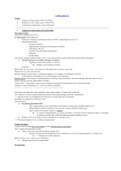4: Peace and war
Content:
1. Congress of Vienna system of IR (1815-1850s)
2. Breakdown of the ‘Vienna system’ (1850s-1870s)
3. A ‘balancing of antagonisms’ system (1870-1914)
1. Congress of Vienna system of IR (1815-1850s)
The century of peace
After WW1, looking back on C19 as:
La belle epoque (The beautiful era)
- Named so in retrospect; contrasting the horrors of WW1; emphasising la joie de vivre.
- Period characterised by
- Economic prosperity
- Regional peace (and peace on the European continent)
- Flourishing of the arts
- Scientific and technological developments
- Optimism
- Social change
Asa result of meetings of different states in 1815, a new system of IR is created, making the continent stable and pacified.
● Warfare had been a way of life in Europe for centuries.
○ Napoleonic warfare and doctrines of ‘total war’.
■ Changes to the mentalities of people.
- In the MA:
Belief in the ‘just war’ theory - only wage war with another state if you have a just cause.
Human life is too costly, given by God.
Moderate attitude towards warfare, something that happens, to be mindful of, but definitely not heroic.
- Under Napoleon & through process of state-building and N-S formation:
Standing armies were developed, a constant profession, receiving a salary (not quickly, short-term rallying troops when there was war).
Military training, education, philosophies of warfare, …
“Total warfare” - less hesitant to wage war, less attached to the principle of proportionality (not wasting human life).
Emphasis on total, annihilating war → crush your enemies completely.
Importance of thinkers like Von Clausewitz (general and military theorist)
Little respect for human life, crush completely so they cannot retaliate } Complete shift in thinking.
Von Clausewitz: no need to make a distinction between civilian targets/settings and military infrastructure.
==> Doctrine of total war in (beginning) C19 becomes very hostile and prone to bloodshed.
Something very antagonistic; hostile until 1815;
Then new period:
● In contrast, period 1815-1914:
○ Only a small number of wars; limited impact and duration; involving only a handful European wars.
○ Mainly bilateral conflicts - limited set of countries (ex. German and Italian reunification).
○ Mainly outside the European continent, in colonies.
■ As a result of industrialisation, new means of transport, a revolution in terms of firepower (guns) → Europeans
are sailing around the globe, colonising, fighting out their competition abroad.
● Estimate: 1815-1914: number of total war deaths was 7x less than in 18C.
==> Why people looked at C19 as a relatively tranquil period.
Congress of Vienna
A system of IR that helps pacify the continent, but also stabilise domestic relationships.
1815: Congress of Vienna (Peace Treaty)
● France + the Great victors (Prussia, Russia, Austria, UK)
○ Thanks to De Taleron (French diplomat), France is brokered in as one of the negotiating parties. ]- already novel.
■ => Emergence of modern diplomacy.
Before: you lose a war → you’re out, no negotiation.
● Delegates from Sweden, Portugal, Spain.
Two main aims:
, ● Restore international peace
Create a new equilibrium among the Great European powers to prevent future war.
● Restore domestic stability
Provide a system of checks and balances against revolutions from laboring classes.
Instrumentalisation of monarchic dynasties: DTRT + family ties across Europe (mutual support).
Why was France not punished more severely?
● Control of French power
- Reduced to roughly size of 1792
- Creation of two buffer states: Kingdom of the NL and Kingdom of Piedmont and Sardinia.
==> France = reduced but still a major power.
Still a force to be reckoned with.
- Fear that a punished France would seek revenge.
- A breakup of France could strengthen one country to the extent that it becomes threatening in turn.
● The final declaration was the result of two committees:
- Committee of 5 great powers: France, UK, Russia, Prussia, Austria.
- Committee of 8 great powers: France, UK, Russia, Prussia, Austria, Portugal, Spain, Sweden.
● Major diplomatic event:
216 political leaders (--> large scale negotiation), 200, 000 visitors (popular voices).
Dozens of commissions collecting data and info, working on the abolition of slavery, the unification of the German states., …
Many celebrations, festivals, re-enactment of battles, concerts.
1.1. Congress of Vienna: IR system of “acting in concert”
(In harmony)
● Established a new international order, based on “acting in concert”.
○ Directory of the Great Powers: regular meetings devoted to the common European interest, the prosperity of the people
and the maintenance of peace.
○ Treaty of the Holy Alliance: Russia, Prussia, Austria
■ Promise to protect each other against attacks from other countries (esp. UK and France as the new dominant
powers in Europe).
1) Recognition of international boundaries and state sovereignty
- Recognition of borders (1815); multilateral agreements
- If there is a need for retaliating against another country, it should be done through a multilateral agreement.
- A country holds control over its own territory and cannot be invaded for no reason.
- Earlier: at a king’s death, all his international treaties had to be renewed.
- Not an automatic renewal, because the state was so linked to a person and not continuous structures.
- Agreements between kings were very vulnerable.
- Now: a system of international rights is established.
- Boundaries not simply drawn between two countries, but included in international treaties.
==> Created stability.
2) Regulated war as an instrument for peace
● Stakes of competition changes: spheres of influence, not territorial enlargement. (+ colonial policies as competition.
○ War was no longer meant to annihilate the enemy, but an instrument for peace.
○ Lesson from the Napoleonic wars: there was little to gain from expansionist politics on the European Continent. Constant
warfare was devastating to the economies.
○ Mutual protection clauses (against revolutions) and limitations on military interventions (1820).
3) Creation of equally powerful countries
Ex. with France.
4) Compliance ensured by dual hegemony:
● UK (‘Pax Britannica’): economic, military and colonial dominance; strong naval fleet.
Countered by:




